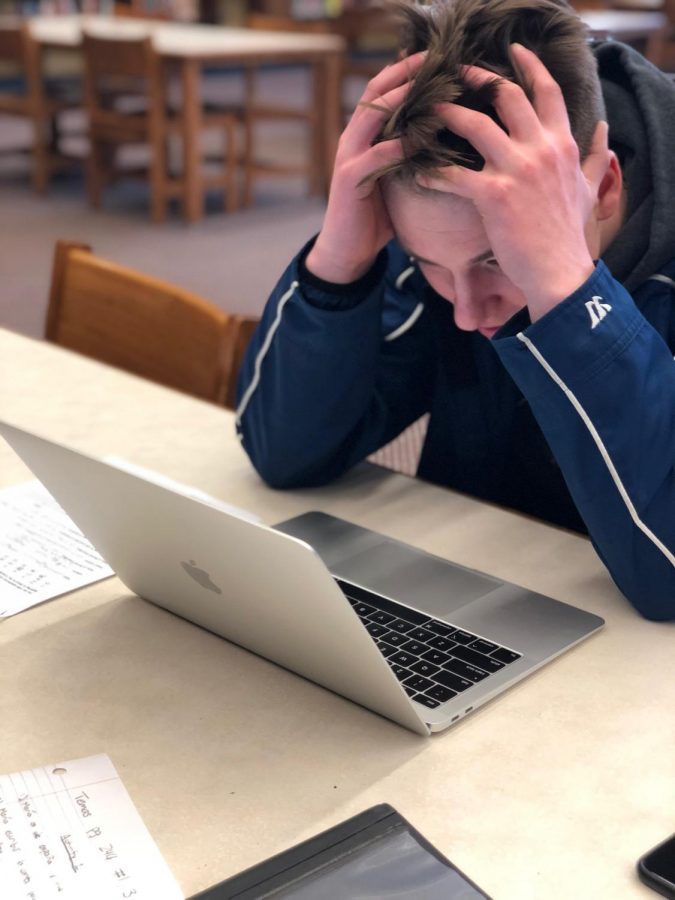Aspen’s Eagle Eye
Aspen shares your data with the state each night… are you at risk?
Senior Justin Szymanski stresses over Aspen as he attempts to check his grades.
February 26, 2019
Imagine this: you are well into your senior year of high school, and you go to defend yourself against robbery allegations. You are innocent, however after searching through your records, the judge states that you were absent on the day of the crime!
How might the state know this you ask? That’s right- Aspen. Many students are unaware of what Aspen is actually used for. It isn’t just for grades- Multiple times a year, a data report is sent out for each student and teacher that contains various information about the individual.
“There are fifty-two data points for each of you (students) that gets reported in one report three times a year, and then your schedules and your grades get reported twice a year,” said Deb Jones, Director of Technology here at Triton.
This information may be jarring to those unaware, but is it truly a danger to students and teachers alike?
The Triton Voice took a deeper look into what actually goes on behind the scenes with Aspen. Through numerous interviews with Jones, Triton Data Specialist Julie Warren, Rebecca Piecewicz, and students and teachers who may or may not be affected, information has been uncovered. An attempted phone call to the Massachusetts Department of Education, and a successful email has gotten us in touch with Jacqueline Reis, Media Relations Coordinator for the DOE.
Before looking into the aspects of Aspen which are unknown by students, The Triton Voice assessed some common complaints about Aspen.
Rebecca Piecewicz told us some common complaints she hears often.
“What I hear from students or even parents, they have a difficult time logging in, they don’t understand how to navigate it,” Said Piecewicz. “They just need more practice, because once you understand the way something works you can just buzz around it.”
Another issue with aspen was brought to our attention by Triton Senior Diego Fernandez.
“I think Aspen is a really useful tool for students to check their grades and keep tabs on how they are doing, but I’d say it isn’t extremely intuit or user friendly. It really enables ‘helicopter parents’.” Said Fernandez.
Deb Jones, Director of Technology at Triton detailed some possible reasons for the complaints she hears about aspen.
“I provide training every fall for new teachers and experienced teachers to get up to speed with the program,” Said Jones. “The complaints that I’ve heard consistently is that there are a lot of clicks to get everywhere. It’s so robust that there’s always more than one way of doing something. That confuses the users a lot.”
Jones also said that Triton’s Data Specialist, Julie Warren, is required to send out data throughout the year about students and teachers. We took a deeper look to find out what exactly Warren is required to do with our data.
“The state collects all kinds of data on the students, on just demographics about students, and then about teachers, and about your classes. They collect all this information about teachers and students, and then they merge it all together to see if it all matches up,” Said Warren. “If we are saying that this teacher teaches these five classes, but they look at the student information and they see that there are no students taking those classes, they are going to ask us about that.”![]() Loading ...
Loading ...
Warren went on to discuss the data collection process.
“They collect the data everyday and every night, and then three times a year we certify the data… It’s all information about who you are, your date of birth, your race, and where you live because they want to make sure that the students who live in our towns are going to our schools.”
The Triton Voice wanted to find out how this data could be used in the future, and whether or not it could be used against us. Warren spoke about that possibility.
“Certainly the information is there, and it’s available. Presumably because students are underage, there would have to be warrants. If a judge were to allow an investigative police department to access the information than I would assume the state would give it to them.”
Warren was asked how long the state keeps our data after graduating, but she could not provide an answer for us. However, Jacqueline Reis, Media Relations Coordinator for the Massachusetts Department of Education was able to provide an answer.
“We keep the data collected for many years for analytical and other reporting purposes. Student privacy laws govern what we share publicly. Even for our own analyses, the aggregate data is what is most useful. For Instance, it is more useful to know that a school offered computer science and that 20 students took it in a particular year, but it is less useful to know that John Doe took it.”
Reis also responded to our question about how the data could be used against us in our futures.
“If it was a legal issue involving a specific student, it’s possible that someone would seek information from the district, which has much more information about individuals than we do. However, there are limits on what districts can share, too.”
Based on the interviews conducted, there seems to be a possibility of student data being used in negative ways, but each source has made it clear that the data would not be very useful.




